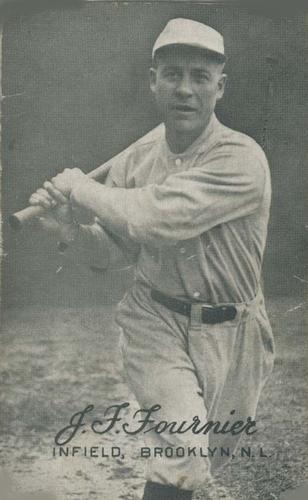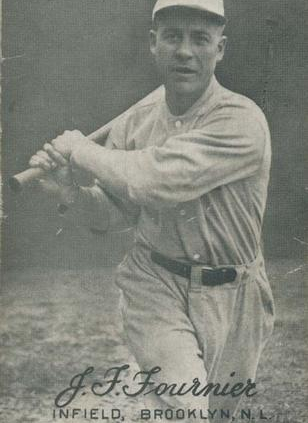July 2, 1925: A Rube Awakening: Brooklyn bats bombard Boston’s Marquard
 Good-looking matchups on paper sometimes fail to deliver anywhere close to anticipated results. Two pitchers who would wind up among baseball’s immortals squared off in an early summer game. One would hurl a complete-game win, while the other would fail to retire a single batter.
Good-looking matchups on paper sometimes fail to deliver anywhere close to anticipated results. Two pitchers who would wind up among baseball’s immortals squared off in an early summer game. One would hurl a complete-game win, while the other would fail to retire a single batter.
Burleigh Grimes and Rube Marquard had faced each other in Brooklyn earlier in the 1925 season. On April 26 Marquard had blanked Boston for eight innings in a 3-0 win. Ten weeks later, a far different game unfolded.
In the top of the first, the Braves could not touch Grimes and his signature grandfathered spitter.1 While two Braves reached via walks and one advanced on a wild pitch, Grimes escaped unscathed.
In sharp contrast, Marquard was bombarded, although he could have sued William Marriott for nonsupport. Leadoff hitter Dick Cox reached on third baseman Marriott’s throwing error. Milt Stock singled. Zack Wheat, the biggest name in the batting order for either team, grounded to Marriott, who booted it to load the bases. Could this have constituted the key play of the game? Had Marriott got one out (or two), might the veteran Marquard have settled down into a groove?
More than a century after this baseball game, these questions recall an anecdote told by a columnist after the 1940 NFL championship game: “Wide open on the Bears’ 4-yard line, Charley Malone dropped a Sammy Baugh pass. Some folks would fantasize that had Malone scored to tie the game at 7 it would have been a different kind of contest. ‘Yes,’ Baugh was reported to have commented, ‘it would have been 73-7 instead of 73-0.’”2
Marquard faced three more batters and yielded a trio of singles. The first, by Jack Fournier, “was the longest ever made at Ebbets Field. It hit the wall near the exit gate in right center. The way [Bernie] Neis went after the ball bluffed Wheat into thinking he was going to catch it. [Wheat] hugged first and then moved to second when the ball caromed off the wall.”3
Since Marquard could not get anyone out, this lucky break failed to help him. Marquard left trailing 4-0 with two men on base. “Bill Vargus, a fledgling left-hander from Boston College, followed the veteran southpaw to the box,” the New York Times reported. “It developed that among the things not included in the curriculum at old B.C. is a course in how to pitch to big league batters.”4
Vargus got the first out of the day for the Braves via a fly ball that extended the Robins’ lead to 5-0. Zack Taylor hit a foul pop, but his opposite number, backstop Mickey O’Neil, dropped the ball for the third Boston error of the inning. Given new life, Taylor squibbed a ball for a single that Vargus threw away for the fourth error of the frame. A lifetime .248 hitter who batted over .300 twice, Grimes hit an RBI single to give Brooklyn a 6-0 lead. After a groundout, the Robins hit four consecutive singles to get into double figures and close the first with a 10-0 lead. “If one of those much-advertised California earthquakes were to do its stuff in Flatbush, pick up the 101st Cavalry Army, a few blocks away from the ball park, and set it down in center field, it could not have loomed up much larger than that gigantic, 10-run half inning,”5 which featured 10 hits, four errors, and two men left on base. The competitive portion of the game had seemingly ended after the initial inning.
The Braves scored a run in the sixth on two singles, a grounder, and a fly ball. Facing Vargus for the final time, Brooklyn put up five in response in the bottom of the sixth. Oscar Siemer, who had replaced catcher O’Neil in the second (suggesting that Boston player-manager Dave Bancroft6 blamed both halves of his battery for the first-inning malfunctions), mimicked his predecessor by likewise committing an error, although this one took place on a throw from Neis to the plate as Cox scored to put Brooklyn up 11-1. Cox scored from second base on a single, illustrating that the Robins sought to score as many runs as possible. Had Siemer made the play, Taylor would not have hit in the sixth with two on and two out. Since Siemer did not hold onto the ball, Taylor got to hit and tripled in two runs to put Brooklyn up 15-1.
Jimmy Welsh homered in the seventh to make the score 15-2. Against Boston’s Foster Edwards, Fournier hit a sacrifice fly to plate Cox in the bottom of the frame as the Robins restored a 14-run bulge at 16-2.
Brooklyn piled on in the bottom of the eighth against the ineffective Edwards. With one out, Hod Ford walked, Taylor singled and Grimes reached on an error by shortstop Bob Smith (the sixth miscue by the Braves) to load the bases. Cox hit a sacrifice fly for one run, Wheat doubled in a pair, and Fournier singled in one more. It was 20-2.
Fans of defensive indifference would have really enjoyed the top of the ninth. Doubtless relaxing, Grimes gave up five hits. Having played errorless baseball to that point, the Robins made two errors. Boston also took six extra bases on indifference before the game mercifully ended with the gridiron-like score of 20-7.
All nine Brooklynites scored and drove in runs. Only Ford failed to have a hit. With a career-high seven RBIs, Fournier had the most impressive box-score line, 5-2-4-7, but many Robins had prime days at the dish, including Cox, who also set a career high with four runs scored. Brooklyn went an impressive 14-for-22 with runners in scoring position.
Marquard completed his Hall of Fame career in 1925. He never won another game in the majors and made his next and final start on August 29. (He gave up six runs and lost.) Marquard pitched his second-to-last game in relief at Ebbets Field on September 6 in the second game of a doubleheader. He gave up a run in an inning. Marquard had fonder Brooklyn memories as a member of the 1916 and 1920 NL champion Robins, but on July 2, 1925, Brooklyn showed that he could no longer effectively pitch against big-league hitters.
SOURCES
In addition to the sources cited in the Notes, the author accessed Retrosheet.org, Baseball-Reference.com, SABR.org, and The Sporting News archive via Paper of Record.
NOTES
1 After the 1920 spitball ban, Grimes was one of 17 pitchers allowed to keep throwing it until retirement.
2 Shirley Povich, “In Football History, 73-0 a Score of Infamy,” Washington Post, December 7, 1990.
3 “The Boston Massacre,” Boston Globe, July 3, 1925: 9.
4 M.W. Corum, “20 Robin Markers Heaped on Braves,” New York Times, July 3, 1925: 9.
5 Thomas Holmes, “Robins Mistreat Braves in Unrestrained Biffing Orgy, Garnering 22 Hits,” Brooklyn Eagle, July 3, 1925: 16.
6 Bancroft, the best player on the below-average Boston team, missed this game after fouling a ball off his foot the previous day. “Dodgers’ First Nets 10 Runs,” Boston Globe, July 3, 1925: 9.
Additional Stats
Brooklyn Robins 20
Boston Braves 7
Ebbets Field
Brooklyn, NY
Box Score + PBP:
Corrections? Additions?
If you can help us improve this game story, contact us.


